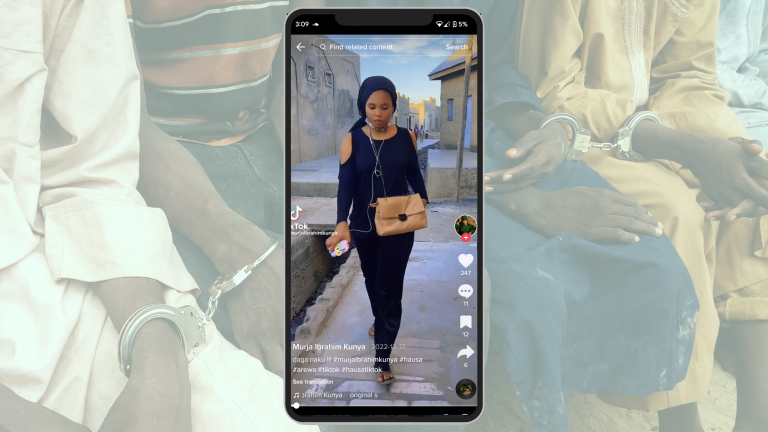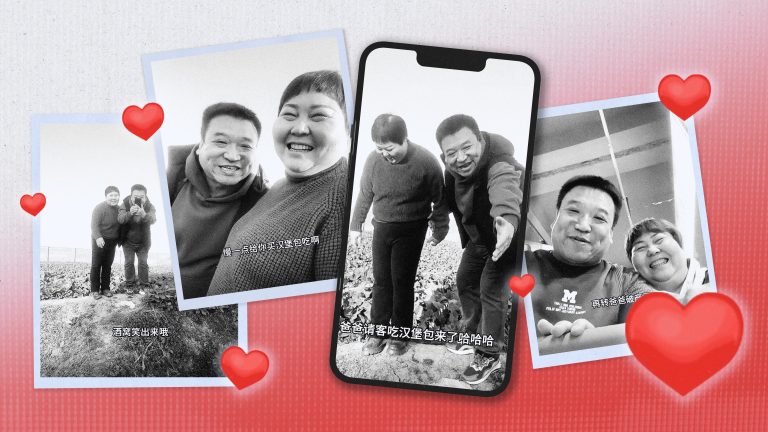Over the past two years, Nazifi Isa Muhammad and his friend, Mubarak Muhammad, had collectively built a TikTok following of nearly 1 million. The duo was known for popular videos that often satirized and questioned influential figures.
They told Rest of World that because of the nature of their videos, they sometimes received threats of arrest. But they had never considered their content political or controversial — and never imagined it would land them in jail for 11 days. “We thought what we were doing was apolitical,” Nazifi said. “We’ve called out dignitaries and leaders from different political parties.”
Over five years ago, he and Mubarak had posted a now-deleted video calling out Abdullahi Umar Ganduje, the governor of Kano state. In the clip, they said the governor slept a lot and was known for selling every piece of land he saw. They satirized allegations of bribery and corruption that had dogged Ganduje since 2018, when a media investigation had captured videos of the governor accepting money from contractors. The state government had denied the allegations, and Ganduje had filed defamation lawsuits against the publication.
Years after the video was posted, Nazifi and Mubarak were detained by the State Intelligence Bureau. On November 7, 2022, the court fined them 10,000 naira ($21.53) each and convicted them of defaming the governor’s character in the video. The court sentenced them to public flogging and 30 days of community service.
Nazifi told Rest of World that they believe the arrests were based on complaints from the Kano State Censorship Board. “We suffered because we didn’t know who was suing us between the state government and censorship board,” he said.
Nazifi and Mubarak are not the only TikTok creators arrested for allegedly violating religious and moral sensitivities in Nigeria over the last year. In late January, Murja Ibrahim Kunya was arrested and eventually charged with several offenses related to her social media posts, which often showed her dancing, singing, or sometimes partying. According to local media reports, there was a petition last fall advocating for Kunya’s arrest, and that of nine other TikTok creators.
“[Kunya] was charged for criminal intimidation, disturbance of public peace, obscene acts, and dishonest execution of deed of transfer, and all of these are provided for in the Kano State Shariah Penal Code law,” Muzammil Ado Fagge, public relations officer for the Kano state’s Shariah court, told Rest of World.

All these cases have involved creators from northern Nigeria, where 12 states uphold Shariah, a legislative system based on Islamic teachings that governs civil — and sometimes criminal — matters. Nazifi and Mubarak’s arrests have sparked concern among digital rights advocates. Amnesty International’s Nigerian director, Osai Ojigho, has called the duo’s sentencing “outrageous” and “the latest to be meted out by Nigeria’s cruel justice system.” TikTok did not respond to repeated requests from Rest of World for comment.
Globally, creators based in conservative societies have faced similar challenges. In January, three Egyptian creators were arrested and held for roughly two weeks after posting a parody video about visiting a detainee in an Egyptian jail. Authorities accused them of spreading false information. In April 2022, another creator in Egypt was sentenced to three years after the court convicted her twice for human trafficking. (Amnesty International called the charges “vague” and said it “found no credible evidence linking [the creator] to any internationally recognizable crime” after reviewing the video in question.) In September 2022, another Egyptian creator, Ibrahim Malik, was arrested for allegedly promoting immoral content.
In Saudi Arabia, Tala Safwan, an Egyptian woman living in Riyadh, was arrested in July 2022 for posting a recorded video chat with a friend — authorities claimed it was suggestive and could impact public morality. And in March 2023, teenage girls in Iran were reportedly arrested for posting a TikTok video of themselves singing and dancing to “Calm Down” by Selena Gomez and Rema. Authorities said the video violated Iranian laws prohibiting women from dancing publicly and failing to wear a hijab. The girls were reportedly forced to record themselves with their heads covered, denouncing the video.
Since their release from prison, Nazifi and Mubarak have changed their content and now avoid political or religious topics. They have also begun to “cooperate with” authorities, including the Hisbah, a religious police force, by reporting inappropriate content on the platform to them.
To avoid being arrested, six TikTok creators in Nigeria told Rest of World they make sure to dress appropriately in their videos, obey Islamic conventions, shun “immoral” sounds, and avoid meddling in issues that “do not concern” them. All requested anonymity for fear of repercussions from authorities. Amina Adam, a 20-year-old TikToker, told Rest of World the app is still widely perceived as negative in Kano. “I was discriminated against in our Islamic school for being a TikTok creator [and] threatened to be withdrawn from the school,” she said. “I had to voluntarily withdraw from Islamic school to continue making videos.”
“I do not see anything legally wrong with the comments made by the TikTokers, which should be seen as a fair criticism of the government.”
Lukman Abdulrauf, a digital rights researcher and residential fellow at Stanford University’s Center for Advanced Study in the Behavioral Sciences, told Rest of World that the pressure these creators face for their political content is unmerited. “I do not see anything legally wrong with the comments made by the TikTokers, which should be seen as a fair criticism of the government,” Abdulrauf said.
Idris Alao, an Ilorin-based lawyer specializing in Shariah, disagrees. He believes authorities should be allowed to arrest creators who violate Shariah provisions, which generally frown upon criticizing the government, immorality, and indecent dressing. “Section 4 of the constitution allows state legislature and legal provisions to limit basic rights such as freedom of expression,” Alao told Rest of World.
“Digital rights in northern Nigeria is peculiar for several reasons,” Abdulrauf admitted. “Islam has very stringent rules regarding slander and social media posts, which as critical of the government can be conveniently regarded as defamatory.”
Veronica Igube, a digital rights lawyer based in Abuja, told Rest of World that social media companies like TikTok are responsible for taking action to protect their users in these situations. “Usually, they just pretend nothing is happening because they also face government actions like bans. We saw what happened with [Nigeria’s] Twitter ban in 2021,” Igube said, referring to the country’s seven-month block on the app. She added that TikTok and other social media companies need to have a dialogue with government agencies and clearly lay out the digital rights of their consumers.
“At the very least, TikTok should have issued a statement condemning or at least clarifying the arrests, especially because these are similar cases around the world. It’s not just in Nigeria,” Igube said.



